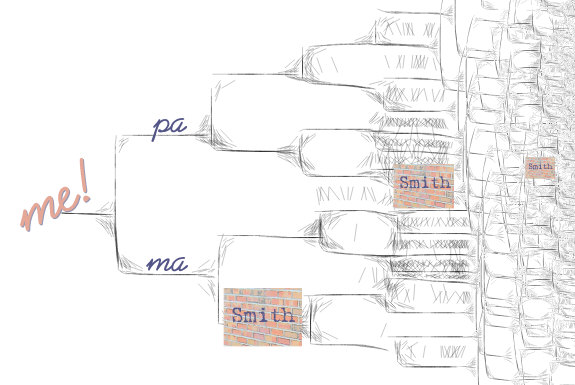#52Ancestors: Delilah Townsend Cornell and her namesake [Tweet this]
Onomastics, or the study of the origin, history, and use of proper names, is sometimes a useful indicator of relationships in genealogy research, but in stories where identities and relationships are well established by other documented facts, a naming pattern may end up overlooked as mildly interesting but irrelevant. Do those cases warrant a closer look at the onomastic evidence?
According to the place history Landmarks of Steuben County, New York, Delilah Townsend was the first wife of Smith Cornell and died in 1829. The 1830 Federal Census indicates five sons and two daughters, but so far, I only know the identities of four of the sons: Smith, Hiram, Socrates, and Hamilton.
Hamilton T. Cornell lived an adventurer’s life—or perhaps a scoundrel’s life, depending on your perspective—but either way, the word “wanderlust” was coined for such as him. He left his wife and six of his eight children behind in New York to seek his fortunes—fortunes that involved lawsuits, miner’s camps, miracle elixir sales, and making it all the way to California with two more wives and at least five more children (see: 1850, 1855, 1860, 1860, 1870, 1875, 1880) in his wake.
One of them, he named Delilah.
Onomastic evidence can take many forms. Traditional naming patterns can provide clues to parents names. Names might hold clues to the parents’ priorities (as with Biblical names, for example). Namesakes can hint at the regard parents may have held for the honoree.
I find it fascinating that long after Delilah Townsend Cornell passed away, and far from the eyes of his family, Hamilton the Adventurer would name a daughter for his mother.
With limited details in genealogy, I think it’s sometimes easy to forget that people are complex. The details Hamilton Cornell left in officials records and in print form one composite picture, and it’s easy to overlook the details that don’t support it–details that suggest that the footloose adventurer loved and missed his mother.
Other views
I’m no expert on onomastic studies, but it is one area that I’m hoping to learn more about throughout this year. I’ll definitely write more on this topic in the future! In the mean time, here are some resources you can view!
- What’s in a Name? via Digging for Ancestors
- Ancestors in the Records: Naming Patterns via Understanding Your Ancestors
- Genealogy: Look for cultural naming patterns by Barry J. Ewell via Genealogy by Barry
- Comments on Naming Patterns via Bob’s Genealogy Filing Cabinet
What about you?
Ever had a breakthrough that began with clues seeded in a personal or family name? Tell me your amazing discoveries related to onomastic evidence in the comments below!
Subscribe now and never miss a post
It’s all fun and games until your genealogy research uncovers something terrible. Next week, we’ll talk about what to do when it happens to you.


